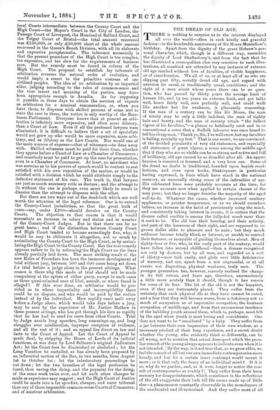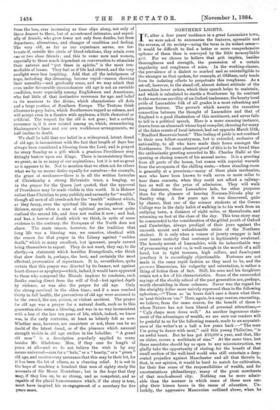THE DREAD OF OLD AGE. T HERE is nothing to surprise
us in the interest displayed all over the world—often in such kindly and graceful fashion—in the hundredth anniversary of Sir Moses Montefiore's birthday. Apart from the dignity of the great Hebrew's per- sonal character, which, though in a different way, resembles the dignity of Lord Shaftesbury's, and from the fact that he has illustrated a cosmopolitan clan very sensitive to such illus- trations, all mankind are attracted by any instance of extreme old age reached without loss of faculties, of visible happiness, or of consideration. We all of us, or at least all of us who are slipping past fifty, secretly dread old age, and regard with aversion its usual, or traditionally usual, conditions ; and the sight of a man about whose years there can be no ques- tion, who has passed by thirty years the average limit of human life, and by ten years an extreme limit, and yet talks well, hears fairly well, sees perfectly well, and could walk like another but for weakness, is pleasantly reassuring. If the man of a century can be like Sir Moses, the man of ninety may be only a little indolent, the man of eighty hale and hearty, and the man of seventy retain " the fullest vigour of his faculties,"—a phrase so habitually used and in so conventional a sense that a Suffolk labourer was once heard to tell his clergyman, "Thank ye, Sir, I'm well enow, but my faculties is failing, specially my feet." That is one secret, we are convinced, of the decided popularity of very old statesmen, and especially old statesmen of great vigour, a sense among the middle-aged that if they who are so visible can be so strong and active and full of brilliancy, old age cannot be so dreadful after all. An appre- hension is removed or lessened, and a very keen one. Some of the dread no doubt is traditional, founded upon boyish recol- lections, and even upon books, Shakespeare in particular having expressed, in lines which have stuck in the national memory, an unusually strong sense of the infirmities of age. His celebrated lines were probably accurate at the time, for they are accurate now when applied to certain classes of the very poor; but they no longer describe the majority of the aged well-to-do. Whatever the cause, whether improved sanitary appliances, or greater temperance, or as we should ourselves believe, an increase in the habit of persistently using the mind, and consistently taking interest in events, it is certain that the disease called senility is among the fully-fed much rarer than it used to be. The old lose their hearing, and their activity, and part of the keenness of their sight, and are supposed to be grown duller alike to pleasure and to pain ; but they much seldomer become totally blind, or fatuous, or unable to control their features, or incapable of guiding themselves about. Men of eighty-four or five, who, in the early part of the century, would have fallen into second childhood—then a disease recognised not only by doctors, but by all men, and regarded as a sort of idiotcy—now talk easily, and glide over little deficiencies of memory, and are, apart from a not ungraceful, or at all
events not disgusting, physical weakness, truly men. The younger generation has, however, scarcely realised the change in its full extent, and fears age, therefore, unconsciously a little more acutely than it should, though it has reason for some of its fear. The lot of the old is not the happiest, even if they are fortunately placed. They suffer from the certainty that such physical ills as they have cannot be cured, and a fear that they will become worse, from a deficiency not so much of occupation as of imperative occupation, the business occupation of middle-age, and from that unconscious insolence of the babbling youth around them, which is, perhaps, most felt by the aged when youth is most loving and considerate. One does not want to be " considered " by a baby. They suffer from a jar between their own impression of their own wisdom, as a necessary product of their long experience, and a secret doubt whether the young, who evidently think so differently, can be all wrong, not to mention that actual disrespect which the pecu- liar conceit of the young always appears to indicate even when it is not intended. [By the way, is it not true that, as we grow older, we feel the conceit of all but our own immediate contemporaries more keenly, and but for a certain inner contempt would resent it more ; or is that only the fancy of an individual mind P If it is so, why do we pardon, and, as it were, forget to notice the con- ceit of contemporaries so readily P] They suffer from their keen memory for disappointments, which sometimes in the reflections of the old exaggerate their bulk till life seems made up of little else—a phenomenon constantly observable in the monologues of the uneducated and ill-restrained. And they suffer most of all from the loss, ever increasing as time slips along, not only of those dearest to them, but of accustomed intimates, and especi- ally of friends, who grow fewer not only from deaths, but from departures, alienations, and changes of condition and feeling. The very old, as far as our experience serves, are for- tunate if, outside the circle of blood-relations, they retain even one or two close friends ; and this to some men and women, especially to those much dependent on conversation.to stimulate their natures and "put them in spirits," is the most irre- mediable of losses. They feel as if life had altered, and the very sunlight were less inspiring. Add that all the indulgences of hope, including day-dreaming, become vapid—reason showing their unreality—and gradually cease, and we may admit that even under favourable circumstances old age is not an enviable condition, more especially among Englishmen and Americans, who feel little of that instinctive reverence for age, and belief in its nearness to the divine, which characterises all Asia and a large portion of Southern Europe. The Teutons think allusions to grey hairs, which Southerners regard as solemn, and will accept even in a theatre with applause, a little rhetorical or artificial. The respect for the old is not gone ; but a certain reverence is, if it ever existed among us, which, remembering Shakespeare's lines and our own workhouse arrangements, we half incline to doubt.
We shall be told that our belief in a widespread, latent dread of old age, is inconsistent with the fact that length of days has always been considered a blessing from the Lord, and is prayed for every Sunday as a gift which a gracious Providence may fittingly bestow upon our Kings. There is inconsistency there, we grant, as in so many of our aspirations; but it is not so great as it appears to be. Not to mention that we often ask for others what we by no means desire equally for ourselves—for example, the grace of meekness—there is in all the written formulas of Christianity a strong Hebraistic trace, a longing, as in the prayer for the Queen just quoted, that the approval of Providence may be made visible in this world. It is Hebrew rather than Christian to pray publicly and earnestly for " wealth," though all men of all creeds ask for the "health" without which, as they fancy, even the spiritual life may be imperfect. The Hebrew, except when a man of spiritual genius, never quite realised the second life, and does not realise it now ; and had, and has, a horror of death which we think, in spite of some evidence to the contrary, the European of the North does not share. The main reason, however, for the tradition that long life was a blessing was, we conceive, identical with the reason for that prayer in the Litany against "sudden death," which so many excellent, but ignorant, people cannot bring themselves to repeat. They do not want, they say, to die slowly,—a statement which horrifies Evangelicals, who think that slow death is, perhaps, the best, and certainly the most effectual, provocative of repentance. It is, nevertheless, quite certain that this prayer was directed by its framer, not against heart-disease or apoplexy—which, indeed,it would have appeared to those who composed the Missals impious to condemn, such deaths coming direct from the will of God—but against depth by violence, as was also the prayer for old age. Only the strong survived in the olden time ; and if a man reached thirty in full health, the preventives of old age were assumed to be the sword, the axe, poison, or violent accident. The prayer for old age was a prayer for a natural death, such as to this generation also seems a blessing, and was in no way inconsistent with a fear of the last ten years of life, which, indeed, we know was, in the early centuries, at least as bitterly felt as now. Whether men, however, are consistent or not, there can be no doubt of the latent dread, or of the pleasure which unusual strength visible in old age excites in the beholder. " A grand old man" is a description popularly applied to many besides Mr. Gladstone. Men, if they care for length of years at all—and we do not believe the wish is by any means universal—care for a " hale," or a " hearty," or a " green " old age, and receive every assurance that this may be their lot, for it has been the lot of others, as a cheering relief. It is not in the hope of reaching a hundred that men of eighty study the accounts of Sir Moses Montefiore ; but in the hope that they may, if they live on, be as strong, and as competent, and as capable of the placid humorousness which, if the story is true, must have inspired his re-engagement of a secretary for five years. more.















































 Previous page
Previous page